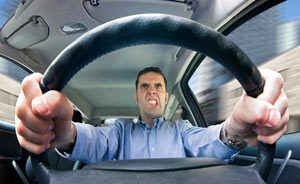Tailgaters

As most motorists will already know only too well, the dictionary defines ‘tailgate’ as a verb meaning ‘to drive too closely behind another vehicle’.
Tailgating is virtually guaranteed to annoy even the most mild-mannered drivers, but worse than that, it is one of the most dangerous driving behaviours on the road. In this article we investigate this infuriating habit of driving too close for comfort in the hope of offering a few safety tips on how to deal with it.
*Tailgating in numbers
– 38% of drivers believed the tailgater exhibited tell-tale signs of road rage
– Almost a third of drivers used a ‘repeatedly hit the brakes’ strategy
– Nearly 1 in 4 chose to speed up
– 18% admitted not leaving a safety gap between their vehicle and the one in front
– Half the drivers questioned had no idea whether or not tailgating was a motoring offence
– 17% of drivers have had their cars damaged in tailgating incidents
– 22% claimed up to £200 on their motor insurance policy to cover the damage
– 18% paid for tailgating repairs out of their own pocket – sometimes nearly £250.
* Figures gathered during a OnePoll survey of 2,000 drivers in April 2022.
Only a fool breaks the two-second rule! The UK Highway Code asks all drivers to maintain a 2-second gap when driving behind another vehicle (hence “only a fool …”).
This sensible advice should help to avoid collisions if the leading vehicle should suddenly brake. This gap should be doubled to 4 seconds in poor weather conditions, while the code recommends increasing the gap further to at least 20 seconds, when driving on roads covered in snow and ice.
Rear-end shunts – According to Motoring Research data obtained from traffic police reports, all kinds of rear-end shunts accounted for nearly 25% of all accidents on UK roads between November 2019 and November 2020. Motor trade mechanics will also be very familiar with the most common kinds of damage sustained by new and used cars because of tailgating accidents, for example:
scratched paintwork
dented bodywork
boot damage
rear light damage
cracked registration plates
rear window damage
problems with structural alignment
Tailgating and the law
Though lots of motorists seem unaware of the fact, tailgaters caught by the police will at least be charged with careless driving. That means 3 points on your driving licence plus a fine of anything up to £100. However, if a tailgating incident also causes a serious accident, drivers could face more severe penalties including heavier fines, or perhaps even a prison sentence.
Apart from the personal consequences, as any private or motor trade insurance broker would confirm, tailgaters would most likely find the future cost of renewing their motor insurance policy would be considerably higher than they would wish.
What causes tailgating behaviour?
It seems obvious that someone driving too close is probably in a hurry, and therefore in a selfish bullying state of mind. However, that’s not always the case. Such drivers could be lacking experience, not concentrating, or even completely unaware of the consequences of their bad driving. Some may also believe they are not breaking the law, or unlikely to be prosecuted for their actions.
Tailgaters can be divided into two categories: ‘aggressive’ drivers who want to overtake you at any costs, and ‘passive’ tailgaters who are generally quite happy to tag along for miles – but drive only a metre or two from your boot.

Strategies for handling tailgating
Aggressive tailgating: Experts advise drivers to adopt a pragmatic response and let the tailgater overtake as soon as it is safe. There are no other strategies (deliberately slowing down, braking sharply and unexpectedly) which aren’t without possible consequences for the innocent driver and other road users.
Peter Rodger, from the Institute of Advanced Motorists (IAM RoadSmart) notes: “Anything you do to try and make them back off will just make them more unpredictable.”
Passive tailgating: In this scenario, Rodger advises slowing down gradually with safety in mind. This may catch the tailgater’s attention and cause them to back off. In any event it will reduce the likelihood of a damaging rear-end collision – and leave the innocent driver less likely to be found to blame if the police, or your insurance broker becoming involved.






